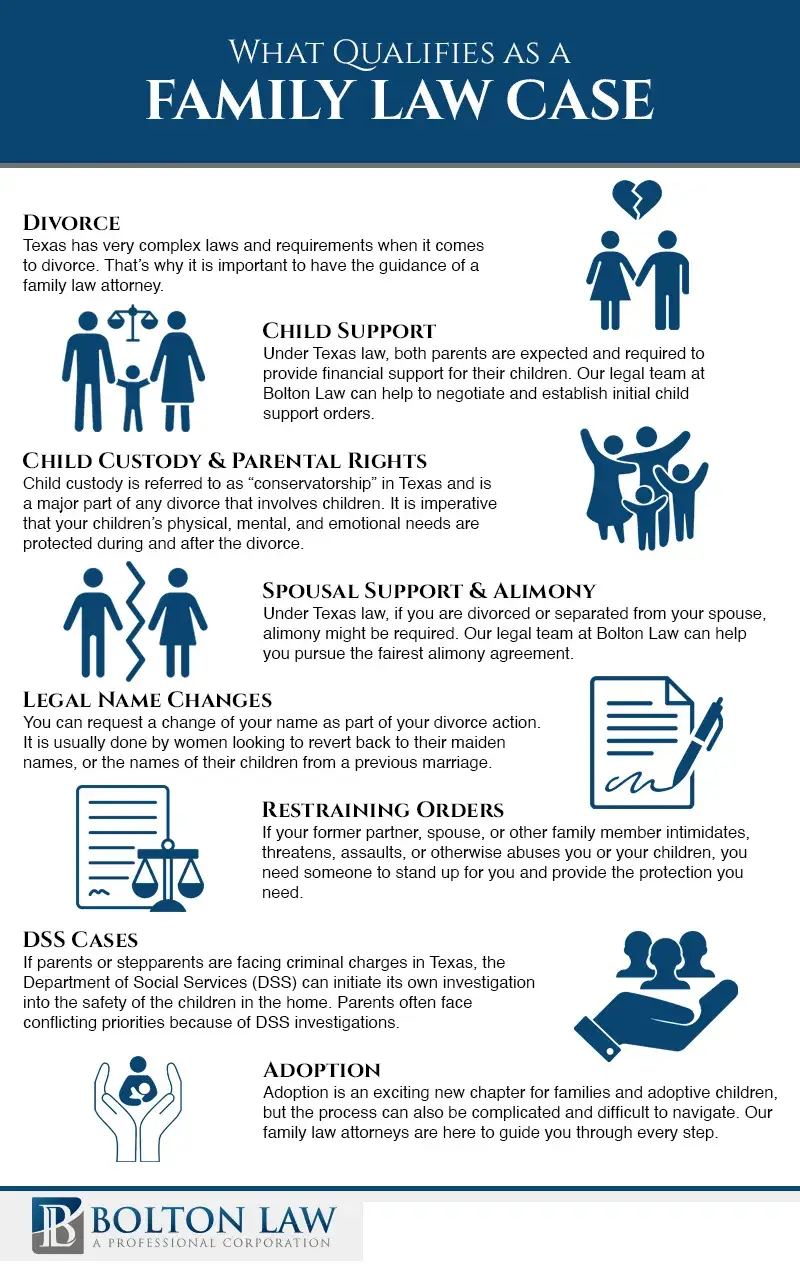Your family matters. If you are involved in a family law case, it is essential to seek guidance from a trustworthy family law attorney. Here at Bolton Law, our attorneys understand the importance of resolving domestic dispute issues as amicably as possible, especially when children are involved.
Call our offices in The Woodlands, Texas today at 281-502-4931 to schedule a consultation and learn more about how our family law attorneys can help you.
What Qualifies as a Family Law Case?
Family law matters are handled by the civil court system and may include domestic disputes between spouses or parents as well as adoptions and legal name changes.
Here are the most common types of family law cases in The Woodlands, Texas:
Divorce
If you are looking to end your marriage, you can file a petition for divorce with the district clerk’s office in your county. If you and your spouse agree on all terms such as alimony, child support, custody, and property division, you can save time and money by opting for an uncontested divorce. When spouses can’t reach an agreement, the contested divorce will end up in court.
Texas has very complex laws and requirements when it comes to divorce. That’s why it is important to have the guidance of a family law attorney in The Woodlands who has your best interests in mind. Bolton Law has experience in all types of divorce cases, including gray divorces and high net-worth divorces.
Child Support
Under Texas law, both parents are expected and required to provide financial support for their children. In most instances, if the parents are separated, it means that one parent will pay the other child support. Our legal team at Bolton Law can help to negotiate and establish initial child support orders.
If changing circumstances get in the way of your ability to meet child support obligations, we can help you pursue modifications to existing orders. We can assist with post-judgment enforcement if your former spouse is neglecting to pay child support.
Child Custody and Parental Rights
Child custody is referred to as “conservatorship” in Texas and is a major part of any divorce that involves children. It is imperative that your children’s physical, mental, and emotional needs are protected during and after the divorce.
The family law attorneys at Bolton Law in The Woodlands, Texas can help you fight to protect your child’s best interests. This may take the form of a sole managing conservatorship if it is in the best interests of your children for them to remain in your care alone or a joint managing conservatorship if you and the other parent are prepared to co-parent the children.
We can help you handle complicated issues related to parental rights and custody such as visitation (parenting time), parental relocation, and paternity.
Spousal Support and Alimony
Under Texas law, if you are divorced or separated from your spouse, alimony might be required. Our legal team at Bolton Law can help you pursue the fairest alimony agreement. If the circumstances change, we can also help you petition the court to modify your alimony order.
Legal Name Changes
You can request a change of your name as part of your divorce action. It is usually done by women looking to revert back to their maiden names, or the names of their children from a previous marriage. Spousal name changes are usually granted even if there are minor children.
If you would like a legal name change, it would be best to do so as part of the divorce because the requirements are usually much stricter in a separate lawsuit. A name change for a child is usually difficult unless it is agreed upon.
Restraining Orders
If your former partner, spouse, or other family member intimidates, threatens, assaults, or otherwise abuses you or your children, you need someone to stand up for you and provide the protection you need. We can help you obtain a restraining order against an abusive person and keep your family safe from domestic violence.
DSS Cases
If parents or stepparents are facing criminal charges in Texas, the Department of Social Services (DSS) can initiate its own investigation into the safety of the children in the home. Parents often face conflicting priorities because of DSS investigations.
Parents and stepparents have the right to remain silent when facing criminal proceedings. Still, they will likely be under a lot of pressure to provide information to the DSS investigators to keep custody of their children.
The legal team at Bolton Law will focus on the criminal charges against you and help you coordinate your defense with the DSS investigation into your children’s safety including what to say and what not to say to the investigators.
Adoption
Adoption is an exciting new chapter for families and adoptive children, but the process can also be complicated and difficult to navigate. Our family law attorneys are here to guide you through every step of the adoption process.
What Are the Grounds for Divorce in Texas?
Under Texas law, there are 7 different grounds for divorce in Texas, including a “no-fault” option.
Insupportability
Insupportability is a “no-fault” basis for divorce. In Texas, you can be granted a divorce if the marriage has become insupportable after being destroyed by conflict without the possibility of reconciliation. It is similar to the “irreconcilable differences” language used in other states.
Cruelty
Cruelty is defined as a situation where a spouse files for divorce since the other spouse is known to exhibit cruelty of such a nature that living together becomes impossible.
Adultery
To be eligible for divorce due to adultery, the party that files the petition for the dissolution of the marriage is required to provide evidence showing that the other spouse actually committed adultery.
Felony Conviction
The fourth ground for divorce in Texas is a standing felony conviction in conjunction with a prison sentence. For a divorce to be granted on the grounds that one spouse has been convicted of a felony, the spouse seeking the divorce is required to show that the other spouse was convicted of a felony offense, was imprisoned for at least 1 year, and wasn’t pardoned for the felony.
Abandonment
In Texas, the spouse filing for divorce on the ground of abandonment must show that the other party left with the intention to abandon the marriage and stayed away for a period of at least one year.
Living Apart
Living apart is another “no-fault” basis for divorce in Texas. If spouses have been living separately without cohabiting at any point for at least 3 years, the court can grant a divorce.
Confinement in a Psychiatric Hospital
If one of the spouses has been confined to a psychiatric facility and it is highly unlikely that they will ever recover, a court can grant a divorce on the grounds of confinement in a psychiatric hospital.
How Do You Start the Divorce Process?
To get a divorce in Texas, you or your spouse must have lived in the state for the prior 6 months and lived in the county where the divorce is to be filed for 90 days. However, a divorce may still be granted if the residency provisions aren’t met, but the marriage took place in Texas.
Once you are served with a petition for divorce in Texas, the law provides that you have until “Monday next following the expiration of 20 days following service of process” to file your answer to the divorce petition.
The divorce process in Texas can quickly become stressful and complicated. In such situations, finding responsive, dedicated legal counsel can make all the difference. Your family law attorney in The Woodlands, Texas can explain each step in detail and make the divorce process as smooth as possible.
How Does the Division of Property Work in Texas?
Texas is a community property state. According to Texas family law, everything that you acquire during the marriage – real estate purchased, money earned, and any other property obtained – is considered to belong equally to both spouses and will be divided by the court.
Divorce courts in Texas are required to consider and divide all the marital property between the two spouses, usually treating the assets and debts incurred and accumulated over the course of the marriage as shared equally between the spouses who are divorcing.
After considering various factors, however, the judge may order a division of property that isn’t 50-50. Texas law provides that community property is divided according to what the judge deems “just and right,” or fair and equitable, to both parties. The result can be something other than an equal split.
The court initially proceeds from the assumption that everything is community property that should be divided equally. Clear and convincing evidence is required to show that something acquired during the marriage isn’t community property.
The general categories of non-community “separate property” are items acquired by inheritance or gift, items owned prior to the marriage, some personal injury lawsuit proceeds, and certain types of disability benefits.
Keep in mind that there are specific complicated rules for separate and community interests in certain assets such as livestock, ranches, and mineral interests. If something is shown to be separate property, it isn’t part of the court’s division of property and is instead confirmed as belonging to the separate estate of the party that owns it.
How Is Child Custody Decided?
If you and your ex-spouse or ex-partner are unable to come to an agreement regarding child custody, options are still available. You can either request to participate in mediation or ask the court to intervene via a trial.
If a trial is required for deciding either legal or physical child custody and visitation, it will be up to the court to determine the rights of both parties to possession and access. To make these decisions, the court considers the following factors:
- Proximity
- The current level of cooperation between each parent
- A parent’s plan for their children
- The need or desire to keep siblings together
- The child’s preference (If he or she is 12 years of age or older)
- Parenting fitness with regard to a history of abuse, physical force, or violence, as well as false reports of child abuse
- Demonstrated parenting skills and who was the child’s primary caregiver previously
At Bolton Law in The Woodlands, Texas, our family law attorneys help clients gather the evidence required to demonstrate the role they play in their children’s lives. However, we typically recommend keeping regular documentation demonstrating your participation in your child’s activities and interests.
What Is Alimony and How Is It Decided?
You may be eligible to receive spousal support (alimony) if you meet certain requirements as outlined by the Texas Family Code. These include:
- If you can’t earn enough income to meet your minimum needs as a result of a disability
- If you have been married for 10 or more years and you no longer have the ability to earn enough income
- If you have primary custody of a child of the marriage who requires substantial supervision and/or care
- If your spouse was convicted of a family violence offense during the marriage
The Texas Family Code also lists several factors that could be used to determine spousal support. These include:
- Ability to independently provide for own minimal needs
- The length of the marriage
- Education levels and the skills of employment
- Physical and emotional condition of the person
- Age, history of employment, and earning capacity
- Each spouse’s contributions to the marriage and family
- Impact of providing for personal needs plus child support
- Property that the spouse brought into the marriage
Need a Family Law Attorney in The Woodlands, Texas?
No matter what type of family law case you might be facing, it is generally advisable to work with an experienced family law attorney. When you do, you will be provided with a tailored approach matching the specific needs of your case. Furthermore, your lawyer can help you navigate the ins and outs of Texas family law.
If you are seeking an experienced family law attorney in The Woodlands, Texas, feel free to get in touch with us at Bolton Law. Call us today at (281) 502-4931 to schedule a consultation with one of our experienced Texas family law attorneys.







